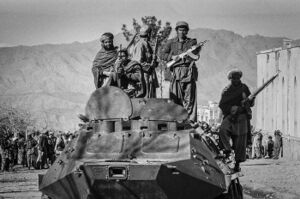Rusani Civil War: Difference between revisions
Created page with "{{Infobox military conflict | partof = | conflict = Rusani Civil War | date = 15 May 1953 – 2 October 1965 <br><small>({{Age in years, months, weeks and days|month1=05|day1 =15| year1=1953|month2=10|day2=02|year2 =1965}})</small> | place = Rusana | image = File:RusCivilWar1.jpg | caption = Fighters aligned with the FDH at a mustering point in Fazil province | result = Victory of the..." Tag: 2017 source edit |
mNo edit summary Tag: 2017 source edit |
||
| Line 13: | Line 13: | ||
| strength1 = 150,000 | | strength1 = 150,000 | ||
| strength2 = 130,000 | | strength2 = 130,000 | ||
| casualties1 = '''Military dead:'''<br /> | | casualties1 = '''Military dead:'''<br />90,000+ | ||
| casualties2 = '''Military dead:'''<br /> | | casualties2 = '''Military dead:'''<br /> 78,000+ | ||
}} | }} | ||
The Rusani Civil War was an internal conflict that took place in the [[Rusana|Islamic Republic of Rusana]] from 1953 to 1965 between two armed coalitions vying for control of the country. The Front for the Defense of the Homeland or FDH was a grouping of conservative and islamist forces which included the officer core of the old Ghanim national army and the Jamaat-e-Islami and Party of God political parties which advocated the imposition of Sharia law and islamism. Notably the Sunni Jamaat and the Shia Party of God put aside their sectarian division aside for most of the war. In opposition to the FDH stood the National Congress for the Defense of the People or NCDP composed of military and tribal elites from regions opposed to the centralization efforts of Javad Spabod and minority ethnic and religious groups wary of the FDH's islamist program. | The Rusani Civil War was an internal conflict that took place in the [[Rusana|Islamic Republic of Rusana]] from 1953 to 1965 between two armed coalitions vying for control of the country. The Front for the Defense of the Homeland or FDH was a grouping of conservative and islamist forces which included the officer core of the old Ghanim national army and the Jamaat-e-Islami and Party of God political parties which advocated the imposition of Sharia law and islamism. Notably the Sunni Jamaat and the Shia Party of God put aside their sectarian division aside for most of the war. In opposition to the FDH stood the National Congress for the Defense of the People or NCDP composed of military and tribal elites from regions opposed to the centralization efforts of Javad Spabod, the Unity Party and minority ethnic and religious groups wary of the FDH's islamist program. | ||
==Background== | |||
===Fragmentation of the Army=== | |||
===Demographic and socioeconomic factors=== | |||
==Warfare== | |||
==Aftermath== | |||
Revision as of 02:55, 11 March 2023
| Rusani Civil War | |||||||
|---|---|---|---|---|---|---|---|
 Fighters aligned with the FDH at a mustering point in Fazil province | |||||||
| |||||||
| Belligerents | |||||||
|
|
Supported by: | ||||||
| Commanders and leaders | |||||||
|
|
| ||||||
| Strength | |||||||
| 150,000 | 130,000 | ||||||
| Casualties and losses | |||||||
|
Military dead: 90,000+ |
Military dead: 78,000+ | ||||||
The Rusani Civil War was an internal conflict that took place in the Islamic Republic of Rusana from 1953 to 1965 between two armed coalitions vying for control of the country. The Front for the Defense of the Homeland or FDH was a grouping of conservative and islamist forces which included the officer core of the old Ghanim national army and the Jamaat-e-Islami and Party of God political parties which advocated the imposition of Sharia law and islamism. Notably the Sunni Jamaat and the Shia Party of God put aside their sectarian division aside for most of the war. In opposition to the FDH stood the National Congress for the Defense of the People or NCDP composed of military and tribal elites from regions opposed to the centralization efforts of Javad Spabod, the Unity Party and minority ethnic and religious groups wary of the FDH's islamist program.